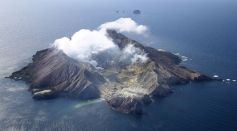ENVIRONMENT & CLIMATE
Study Reveals a Surprising Similarity Between Bonobos and Humans

5 Ways to Reduce Your Christmas Tree’s Carbon Footprint

Curator Reveals How Some Australian Mammals are Glowing Under UV Light

Upcycling Instead of Recycling: Turning Plastic Bags Into Adhesives
Contagious Yawning, Also Seen in Orangutans

10 Best Inventions From 2020

Kangaroos Use Unique Gaze to ‘Talk’ to Humans
Scientists Found the World's Oldest Python Fossil That Lived 48 Million Years Ago

On TED Talks, Female Style of Speaking More Popular

Researchers Answer Why Australia is Such A Volcanic Hotspot, Despite Not Being on the Ring of Fire
Meet the Ten People Who Played Important Roles In Science In 2020

COVID-19 Pandemic Renewed Interest in Gardening and the Outdoors
World's Largest Renewable Energy Megapark in India Is As Big As Singapore

Critical Temperature Rise Reduces Tropical Tree Lifespan
Most Popular

Catch The Blood Moon: Where and When to See the Total Lunar Eclipse on March 3, 2026

Rare Blood Moon Lunar Eclipse Illuminates the Skies Over North America

The Neuroscience of Habit Formation: What Behavior Science Reveals About How the Brain Builds Routines

How Ocean Currents Shape Climate Patterns and Drive Weather Science on Land





